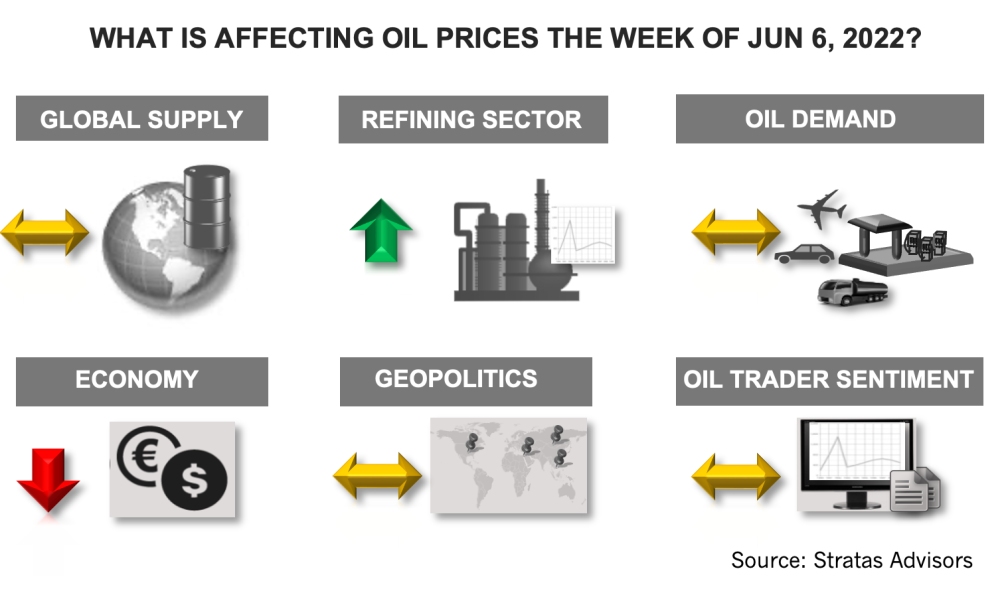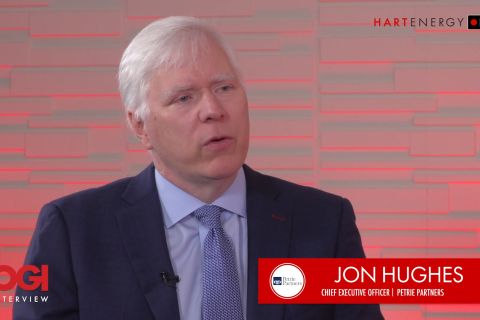
Stratas Advisors also expects the oil supply situation will stabilize and the global demand growth will remain moderate over the next few months. (Source: Shutterstock.com)
Editor’s note: This report is an excerpt from the Stratas Advisors weekly Short-Term Outlook service analysis, which covers a period of eight quarters and provides monthly forecasts for crude oil, natural gas, NGL, refined products, base petrochemicals and biofuels.]
The price of Brent crude ended the week at $119.72 after closing the previous week at $119.43. The price of WTI ended the week at $118.87 after closing the previous week $115.07.
During the previous week there were some newsworthy developments. Firstly, OPEC+ met last week on June 3 and decided to increase supply by 648,000 bbl/d in July and August. The additional increase stems from bringing forward the planned September volumes and spreading them across July and August with the intent to match the increased demand associated with the summer months in the northern hemisphere. While OPEC+ continues to increase supply quotas, OPEC+ is struggling to increase actual supply, and in April supplied 2.7 million bbl/d below the agreed quotas. Besides Russia, several of the African producers—Libya, Angola and Nigeria—are continuing to underproduce because of internal conflict.
Additionally, the EU finally reached an agreement to ban imports of crude oil (and refined products) from Russia, with the initial focus on imports delivered via ship, with the intent that imports via pipeline will ultimately be banned. We have been expecting that the EU would reach a formal ban and once in place that Russian exports of crude oil would decline by a net 1.5 million bbl/d with a portion of the lost volumes to Europe being offset by increased exports to Asia and other markets. However, we expect that the net loss will be reduced overtime, as Russia (and importing countries) finds ways to mitigate the barriers hindering Russian oil exports.
The EU is also working to implement a ban on insurers covering oil tankers (oil and refined products) that will be phased in over six months. The ban would affect insurance for physical damage and losses from oil spills and insurance providing protection and indemnity against liability from third parties. The EU is hoping that since European companies provide insurance for most of the world’s oil trade, the ban will hamper Russia’s ability to export oil to Asia and other regions outside of the EU. And it is most likely the ban will create more friction; however, because of the importance of oil to the economies of major growing and developing economies, and to the economy of Russia, we believe that the proposed insurance ban will ultimately have limited impact on Russian exports of crude oil and refined products.
From a demand perspective, U.S. gasoline demand continues to lag. The latest weekly report from the Energy Information Administration indicates that gasoline demand in the U.S. increased to 8.98 million bbl/d from the previous week of 8.8 million bbl/d. In comparison, for the same period of the previous year, gasoline demand was 9.15 million bbl/d. Based on the four-week average, current gasoline demand is running 584,000 bbl/d less than for the same period of 2019. Diesel demand is also last robust, as indicated by the latest four-week average, which shows that diesel demand is running 158, 000 bbl/d less than in 2019.

In our note of the previous week, we suggested that oil prices would not move significantly higher than $120 over the next few months, in part, because our expectation that the supply situation would stabilize, and that global demand growth would remain moderate. After the developments of last week, we are still holding to that view.
About the Author: John E. Paise, president of Stratas Advisors, is responsible for managing the research and consulting business worldwide. Prior to joining Stratas Advisors, Paisie was a partner with PFC Energy, a strategic consultancy based in Washington, D.C., where he led a global practice focused on helping clients (including IOCs, NOC, independent oil companies and governments) to understand the future market environment and competitive landscape, set an appropriate strategic direction and implement strategic initiatives. He worked more than eight years with IBM Consulting (formerly PriceWaterhouseCoopers, PwC Consulting) as an associate partner in the strategic change practice focused on the energy sector while residing in Houston, Singapore, Beijing and London.
Recommended Reading
Kimmeridge Fast Forwards on SilverBow with Takeover Bid
2024-03-13 - Investment firm Kimmeridge Energy Management, which first asked for additional SilverBow Resources board seats, has followed up with a buyout offer. A deal would make a nearly 1 Bcfe/d Eagle Ford pureplay.
Laredo Oil Subsidiary, Erehwon Enter Into Drilling Agreement with Texakoma
2024-03-14 - The agreement with Lustre Oil and Erehwon Oil & Gas would allow Texakoma to participate in the development of 7,375 net acres of mineral rights in Valley County, Montana.
SLB’s ChampionX Acquisition Key to Production Recovery Market
2024-04-21 - During a quarterly earnings call, SLB CEO Olivier Le Peuch highlighted the production recovery market as a key part of the company’s growth strategy.
Hess Corp. Boosts Bakken Output, Drilling Ahead of Chevron Merger
2024-01-31 - Hess Corp. increased its drilling activity and output from the Bakken play of North Dakota during the fourth quarter, the E&P reported in its latest earnings.
The OGInterview: Petrie Partners a Big Deal Among Investment Banks
2024-02-01 - In this OGInterview, Hart Energy's Chris Mathews sat down with Petrie Partners—perhaps not the biggest or flashiest investment bank around, but after over two decades, the firm has been around the block more than most.





